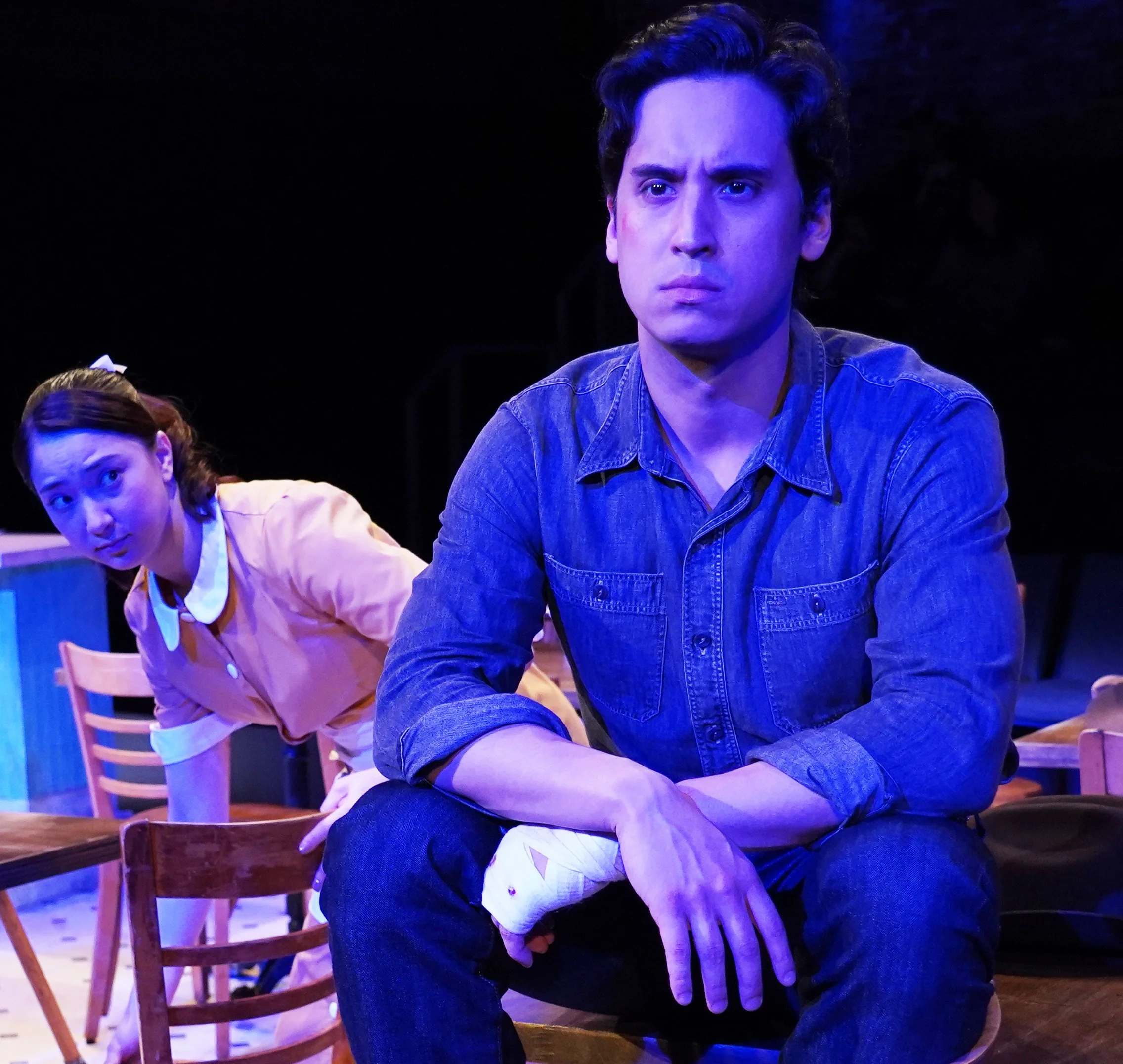Snowbound travelers Cherie (Midori Francis, left) and Gerald Lyman, Ph.D. (Rajesh Bose, right) pass the wee hours with small talk while Grace (Cindy Cheung, center left) and Elma (Delphi Borich) prepare snacks in William Inge’s Bus Stop.
Bus Stop, the third of four Broadway successes that playwright William Inge scored between 1950 and 1959 (the second, Picnic, won the 1953 Pulitzer Prize), takes place in a small-town diner on a route between Kansas City and Topeka. Grace (Cindy Cheung), the proprietor, keeps the place open all night, when necessary, as a refuge for travelers marooned by inclement weather. During a blizzard, a Topeka-bound bus arrives around 1 a.m.; the driver, Carl (David Shih), informs his four passengers that they’re stranded until highway crews clear the road ahead.
Rodeo rider Bo Decker (Michael Hsu Rosen) broods while Elma looks on in William Inge’s 1955 play. Photographs by Carol Rosegg.
Inge—contemplative bard of the American heartland—excelled in realism tempered by lessons from Chekhov: each of his dramas is an insightful account of disappointment, leavened with knowing humor. The nighthawks in Bus Stop are ordinary folks, yet distinctive in a Chekhovian way, with a common denominator of loneliness. Bo Decker (Michael Hsu Rosen) and his buddy Virgil (Moses Villarama), who’ve been in Kansas City for the annual rodeo, are headed home to Montana. Virile, handsome, and naïve, Bo introduces himself in a speech that, as usual with Inge, has a ring of authenticity and is metrically just right:
I’m twenty-one years old and own me m’own ranch up in Timber Hill, Montana, where I got a herd a fine Hereford cattle and a dozen horses, and the finest sheep and hogs and chickens in the whole country. And I jest come back from a rodeo where I won ’bout ev’ry prize there was.
Carl, the bus driver—speaking to the local sheriff (David Lee Huỳnh)—calls Bo “a real troublemaker … first time off a ranch and wild as a bronco.” Bo’s rodeo skills are useless in personal relationships, and his lamebrained stunts get him in trouble. That’s why he needs Virgil, who’s older and wiser, as his traveling companion.
While in Kansas City, Bo has met Cherie (Midori Francis), who calls herself a “chanteuse” and probably turns the occasional trick when the money’s right. After a few dates and a certain amount of intimacy, Bo has become obsessed with Cherie, mistaking the satisfying sexual initiation he’s had at her hands for true love. On his way out of town, Bo has shanghaied her, intending to make her the chatelaine of his ranch. It’s this situation that requires the sheriff’s intervention.
Cherie, who calls herself a chanteuse, tells the unworldly Elma about the highs and lows of working in a nightclub.
The fourth traveler is pompous Gerald Lyman, Ph.D. (Rajesh Bose), a creepy rover who claims he’s a college professor. Lyman spends the night (until he drinks himself into a stupor) urging Elma (Delhi Borich), a high school student waiting tables in the diner, to meet him in Topeka later in the week. Those around them recognize what Lyman is up to; greenhorn Elma, wowed by the older man’s erudition, is susceptible to his blandishments.
Co-produced by Classic Stage Company, NAATCO, and Transport Group, Bus Stop is directed by Jack Cummings III, who staged notable rotating revivals of Inge’s first play, Come Back, Little Sheba, and Picnic Off-Off-Broadway in 2017. The current production features a well-balanced ensemble of eight felicitously cast actors. In a role identified with Marilyn Monroe from her 1956 screen performance, Francis captures exquisitely Cherie’s combination of pertinacity and poignancy. She and Rosen are both prone to sotto voce dips in delivery, but a lost phrase or two is a modest price for the tension and suspense they create in their powerful scenes together. And Francis, like Monroe, has an incandescence that’s all her own.
Cummings, Peiyi Wong (scenic design), and R. Lee Kennedy (lighting) have liberated Inge’s script from the confines of a proscenium, resituating it on a long, narrow rectangle, with spectators on three sides. Classic Stage Company’s intimate playhouse brings the audience, even those in the back, very near the performers and offers a close perspective on the intricacy of their characterizations. Kennedy’s lighting is sensitive to the frequent shifts of dialogue among pairs and groups and, at times, to a soliloquizing actor. He uses spot-lighting like a camera lens, to focus, as appropriate, on a single actor (or two or a group), with the rest of the playing area unobtrusively dimmed.
The reputation of Bus Stop has been tarnished by its ubiquity in summer stock, where casts are frequently not up to the task of penetrating the script’s serene surface and exploring the caverns of subtext underneath. Those emotional caverns and the secrets they conceal are what makes Inge’s writing ripe for rediscovery.
Bus Stop plays through June 8 at Classic Stage Company (136 E. 13th St.). Evening performances are at 7 p.m. Tuesday through Saturday; matinees are at 2 p.m. Wednesday, Saturday and Sunday. For tickets and information, call (212) 677-4210 or visit classicstage.org.classicstage.org.
Playwright: William Inge
Director: Jack Cummings III
Scenic Design: Peiyi Wong
Lighting Design: R. Lee Kennedy
Costume Design: Mariko Ohigashi





